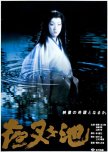A fable of human love caught in the current of nature's wrath
An adaptation of the 1913 play of the same name, Demon Pond blends theatrical artifice with cinematic surrealism offering a compelling lesson in the power of superstition and mythology; defined by a pervasive tension between the ancient and the modern, superstition versus scientific reason, an aquatic tale of life and death. We live as long as we have it, but if we lose it, we die, except the film's true subject is love. We can live without it, but is that really living? In Masahiro Shinoda's lush, romantic, bigger-than-life take on Izumi Kyōka's text, the answer is a resounding no. What starts as a folk horror fantasy with a psychological thriller vibe gradually shifts into full-on action-adventure-meets-disaster film mode once all watery hell breaks loose. Shinoda's is extraordinary in its dreamlike decadence, it's the kind of film that could get by strictly on aesthetic terms, such a feast for the eyes and ears, that it almost wouldn't matter if the story didn't make much sense or even had one to begin with. Set to the swirling strains of Isao Tomita's utterly hypnotic synth score and bolstered by some great acting from its cast, Demon Pond is a fascinating experience; one that arguably runs a little long at two hours, but which remains endlessly captivating thanks to its beauty, elegance, and portrayal of a fable of human love caught in the current of nature's wrath.
Questa recensione ti è stata utile?






